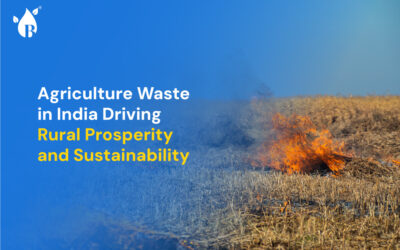
India, with its rapid industrial growth, faces the dual challenge of driving economic progress while addressing its carbon footprint. Some industries, due to their inherent energy demands and complex processes, find it particularly difficult to reduce emissions. These industries, often referred to as hard-to-abate sectors, are responsible for a significant portion of the country’s greenhouse gas emissions. To tackle this, the shift toward renewable energy sources, especially biofuels, is becoming an essential strategy.
What Are Hard-to-Abate Sectors?
Hard-to-abate sectors are industries that cannot easily transition to low-carbon alternatives due to the nature of their operations. These sectors include cement, steel, aviation, and shipping, all of which rely on high-energy processes and have limited options for electrification or alternative fuel adoption in the short term.
- Cement Production: Cement manufacturing involves high-temperature processes that traditionally rely on coal. Replacing this with renewable energy or cleaner fuels is challenging but necessary.
- Steel Manufacturing: The steel industry depends on blast furnaces and other energy-intensive processes. Shifting to hydrogen or electric arc furnaces on a large scale requires significant investment and infrastructure.
- Aviation and Shipping: Both of these industries rely heavily on jet fuel and marine fuel, respectively, making it difficult to reduce emissions without transitioning to biofuels or sustainable aviation fuels (SAF).
The Role of Biofuels in Reducing Industrial Emissions
Biofuels, derived from renewable sources like agricultural residues, are emerging as a viable solution for these industries. They can replace conventional fossil fuels, providing a cleaner alternative that helps industries reduce their carbon footprint while still meeting energy demands.
- In Cement and Steel: Biofuels such as biomass briquettes can replace coal in boilers, offering a more sustainable option without compromising performance. These biomass alternatives help in reducing the reliance on coal and lowering emissions from industrial furnaces.
- In Aviation and Shipping: Sustainable aviation fuels (SAF) derived from biofuels are being explored as a way to decarbonize air travel. Similarly, biofuels are being tested in shipping to reduce the industry’s carbon emissions and reliance on crude oil.
Challenges in Decarbonizing Hard-to-Abate Sectors
Despite the promise of biofuels, the transition is not without its challenges. Industries like cement and steel face high capital costs for infrastructure changes, while sectors such as aviation struggle with the availability of sustainable fuel options. Additionally, scaling biofuel production to meet the large demands of these sectors requires investment in supply chains and logistics.
However, the need for change is clear. With India aiming for net-zero emissions by 2070, addressing emissions in hard-to-abate sectors is crucial. Policy initiatives, government incentives, and innovations in the biofuel sector are key to accelerating this transformation.
How Biofuels Can Drive ESG Goals
For companies in these sectors, the adoption of biofuels is more than just an environmental necessity—it also aligns with ESG (Environmental, Social, and Governance) goals. Industries are increasingly being held accountable for their environmental impact, and biofuels offer a path to achieving sustainable operations.
By integrating biofuels into their energy mix, companies can lower their Scope 1 emissions (direct emissions from their operations), Scope 2 emissions (indirect emissions from electricity usage), and even Scope 3 emissions (emissions throughout their supply chain). This not only reduces their overall carbon footprint but also enhances their reputation as responsible corporate citizens.
The Way Forward
The future of India’s decarbonization efforts lies in the successful transformation of its hard-to-abate sectors. While biofuels alone won’t solve all the challenges, they play a critical role in the broader strategy to reduce emissions. As industries adopt biofuels and transition to cleaner energy sources, they can contribute significantly to India’s climate goals.
For businesses looking to explore biofuel solutions, platforms like Buyofuel provide a curated marketplace for sourcing high-quality biomass briquettes and other renewable energy solutions. Whether for industrial boilers, transportation, or other applications, biofuels are paving the way for a greener, more sustainable future.



